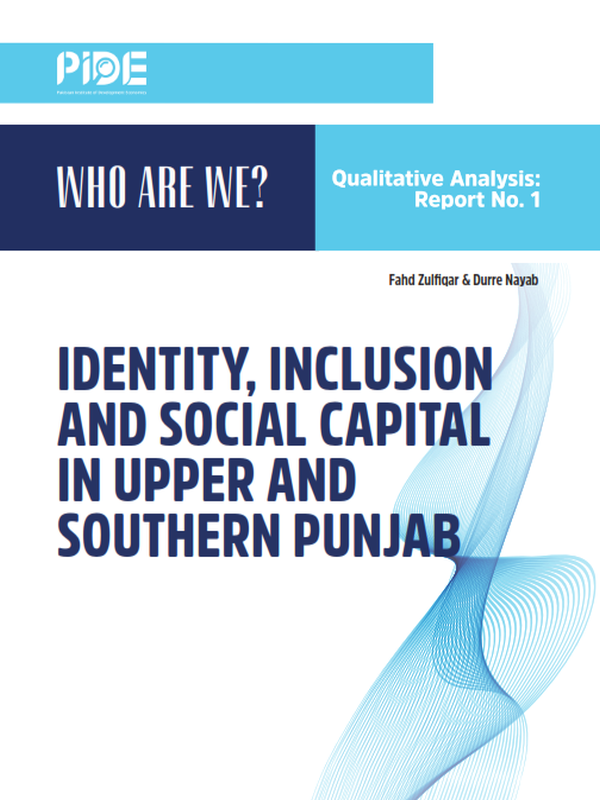
Pakistan Institute of Development Economics
- Home
Our Portals
MenuMenuMenuMenuMenuMenuMenu - ResearchMenuMenuMenuMenuMenuMenuMenu
- Discourse
- The PDR
- Our Researchers
- Academics
- Degree Verification
- Thesis Portal
- Our Portals
Identity, Inclusion And Social Capital In Upper And Southern Punjab
- Introduction
To understand the historical, socio-cultural, and behavioral aspects and features of Pakistanis, PIDE conducted a country-wide survey which has been compiled into various thematic research notes. The PIDE BASICS Survey covers the Beliefs, Attitudes, Social Capital, Institutions, Community and Self. The PIDE-BASICS notes published, so far, have focused on different dimensions of constitutive elements which describe the people of Pakistan. The themes include theories of social capital, identity, desire to live in Pakistan, social and civic engagement, infrastructural facilities, spiritual beliefs, and language as harmony. The findings of the survey are quantified to provide a broader picture of the themes mentioned in the preceding text.[1]
The PIDE-BASICS Notes’ findings illuminate trends and patterns in describing who we, Pakistanis, are. The findings, however, are quantified and need a more in-depth understanding for which primary data grounded in qualitative research methodology was needed. In-depth unstructured interviews and focus group discussions were conducted in Islamabad, Rawalpindi, Bahawalpur, and Multan to explain the survey’s findings and thematically narrate the twelve key themes of the PIDE-BASICS survey. The type of unstructured interviews conducted were episodic in which we collected both forms of knowledge; semantic and episodic. The questions under elicitation of semantic knowledge focused on:
- What is identity? Is identity important to define a person? What are the markers of identity?
- Is society important? What roles does society function? Along what axis can society’s role and its importance be spelt out?
- What is the importance of community organizations, social groups, social clubs, and civic engagement in creating a sense of community and belonging?
- Is Pakistan a socio-cultural space for tolerance, socio-civic engagement, and socialization?
- Do Pakistanis trust each other socially? What is the relationship of the trust of Pakistanis with the community? What is the relationship of trust of Pakistanis with the government, State, army, police and judiciary?
- What is the state of the provision of public spaces, community centers, libraries, and playgrounds to Pakistanis?
- What are the dreams of Pakistanis? What do they want to achieve? Does education help translate into securing jobs?
- How does social capital play role in meeting outcomes and outputs for Pakistanis?
- Why do Pakistanis want to leave the country and settle abroad?
The questions under elicitation of episodic knowledge focused on similar themes which were contextualized in a particular time, space, and experience of the respondents, as detailed below:
- In the articulation of your own self, is gender/caste/profession/religion/age/social group/sexual orientation an important marker? Is there any experience which signifies your response? (Probing questions based on a person’s contextual experience located in time and space were asked)
- Are relationships important to you? Which relationships have shaped your social life? (Probing questions and prompting techniques were used to elicit data).
- In society vs. individual debate, where do you stand yourself? Any experiences from your life you want to focus on? (Related follow-up questions- probing- were asked)
- Are you part of any social club, organization, community center, etc.? (Details related to his/her engagement with the group/center/club, the role of these clubs in civic engagement, socialization and building community and sense of community were extracted from the respondents)
- Interviews conducted with minorities (sexual, religious, ethnic and sectarian) focused on the themes of fear, integration with the majoritarian groups, identity markers, experiences of marginality, and the role of community building were asked).
- The experiential data of the respondents based on their relationships and trust between them, their trust in the state, government, police and judiciary were extracted.
- What are your dreams? Where do you want to see in the next 5 years? How do you see your dreams will come true?
- If given an opportunity of settling abroad with stamped visas and secured employment, will you leave Pakistan?
- What adjective(s) comes to your mind when the word Pakistanis is spelt out to you?
During focus group discussions, the role of researchers was moderators who facilitated the conversations, breaking the ice, ensuring creating dynamic groups, conducting focus groups, and analyzing the data. Focus groups were systematically organized taking into consideration the practicalities such as timings. The diversity in focus group dynamics was also ensured so that respondents from different age groups, ethnicities, educational attainment, and socio-economic status were included. The details of the focus group discussions are tabulated below. The overarching themes questions were asked were personal, family, marriage, community, society, ambitions & aspirations, education & technology, sports & recreation, economics & employment, corruption, government and politics, religion & faith, & ethics & morality.
__________
[1] Some of the key takeaways of the BASICS research notes are detailed in the annexure.
__________



